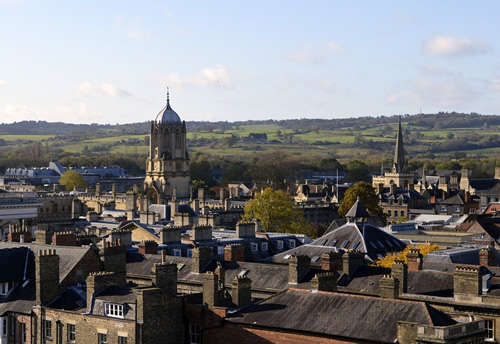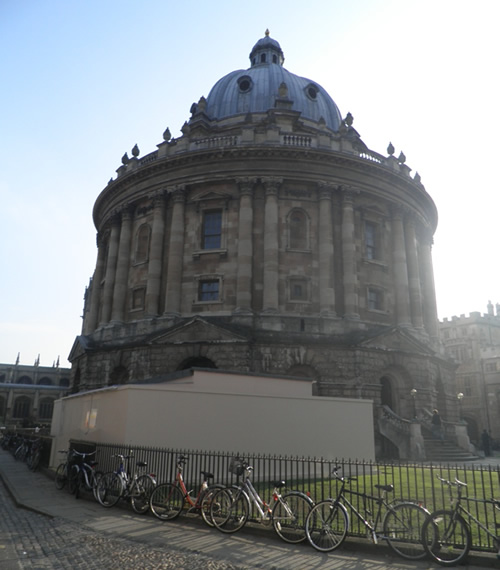Study Abroad at Oxford University
A Year Living in the City of Dreaming Spires
By Melissa Browne

|
|
The skyline of Oxford.
|
Fears and Expectations at Oxford: “You want me to do what?!”
For many reasons, I found it exceptionally difficult to leave my home university, the College of the Holy Cross. I had formed a comfortable group of friends over the past two years. I had settled into my major (Classics) and knew what to expect in almost any academic situation. When I first applied to Mansfield College, Oxford, through Holy Cross' Study Abroad program, I was intimidated by what lay before me: one to two 2,000 to 3,000-word essays per week, plus hour-long primary (once a week) and secondary (once every other week) tutorials. Along with Oxford's academic side, I was apprehensive about fitting in and finding my way into a new school, city, country, and culture. This describes the muddled mental mess in which most potential abroad students, particularly future Oxford abroad students, find themselves; I now know that questioning your ability to survive in a new school, and such a notoriously rigorous one, is absolutely normal. I was scared to begin Oxford for fear of my inability to "keep up" and find my niche in the city of dreaming spires. Still, all I needed was a little time to get comfortable.
What to Know Before You Leave and When You First Arrive at Oxford
Customs may ask for proof of acceptance to Oxford; I carried an affidavit from Holy Cross and my acceptance letter to Mansfield.
Pack lightly: Most airlines allow one checked bag, so plan accordingly. There are plenty of department stores in Oxford where you can acquire basics such as sheets, comforters, kitchen supplies, rain boots, and clothing.
Off the plane: From Heathrow and Gatwick Airports, you can take a coach with National Express starting at £22, which runs frequently through day and night. It is a simple, inexpensive way to get to Oxford no matter what time your flight lands, and leaves from the Bus Depot of either airport. Tip: you can buy your ticket online to book the trip.
Mobile phones: If you are not using an international plan from your home provider, there are plenty of mobile phone stores in Oxford, most of them not very costly. I bought mine from Tesco Mobile, part of a chain. For those looking for a plan, you can find many mobile stores online and in person with plans to suit your needs.
Communicating Internationally: Calling home from your mobile can be expensive when you are not using WiFi, so an alternative is to create a free Google Mail or other email account or even use Skype, Zoom, Meetup, WhatsApp, and other websites and apps to meet your favorite communication needs for free.
Food: There are two major grocery chains in Oxford on the most significant commercial streets: Sainsbury's and Tesco. You can generally find comparable products and prices at each. Both have "reward points" systems in which it is worth investing since accumulating points leads to coupons and vouchers. If you do not plan on cooking for yourself, another option is your college's dining hall. International students are often housed off-campus, so many, like me, choose to split their time between attending Hall and cooking. There are also plenty of restaurants and sandwich shops throughout Oxford; the English often grab a sandwich for lunch at a little hole-in-the-wall joint. Alternative Tuck Shop on Holywell Rd. is my favorite.
Monetary management: I kept my American bank account through Bank of America because you can withdraw British pounds with no fee at Barclay's, Bank of America's partner bank in the U.K. Some create a U.K. account to use a debit card without incurring a fee (I suggest Barclay's and NatWest banks). Both require letters or original documents to open an account, so check which are necessary before leaving.
Healthcare: Always travel with proof of insurance. Mansfield required me to register with a local clinic under the National Health Service (NHS).
The 40-Library Dash: The Oxford Academic Experience
I initially found the most challenging aspect of staying afloat academically at Oxford to be the library system. There are many libraries here — the Bodleian above all, which houses every book printed in the U.K., but from which you cannot check out books — as well as libraries for academic departments (History Faculty Library, etc.) and college libraries. Before term started, I attended a subject-specific orientation, which taught me how to use the libraries. If you need a book from the Bodleian, use SOLO, the Oxford library search engine, and order the book to be sent to a reading room. My favorite reading room is Upper Radcliffe Camera, for its gorgeous dome and sweeping view. Since I am abroad for the year, I have the incredible privilege of having access to libraries as if I were a full-time student. The system is extensive but navigable; since you don't have to buy books, you save loads of money.

|
|
Oxford Radcliffe Camera on a sunny day. Photo by Melissa Browne.
|
Tutorials themselves and writing that many papers are sometimes highly stressful, especially in 2-tutorial weeks. But in reality, tutors are mostly very friendly, and since the tutorial system works on a one-on-one or two-on-one basis, they get to know you well. I usually find my books 3-4 days in advance, read them 2-3 days ahead, and write the paper the night before the tutorial. As with anything, it took me a little time to establish a routine and place to study. I prefer my room; it is easier to bring my books here than to drag them, my laptop, charger, and converter around Oxford. An average tutorial is around an hour (my Odyssey tutorial at Christ Church was 75 minutes.) Often, a tutor will have you read the essay aloud and either stop you at various points for discussion or allow you to read through and write comments. The conversations are often lively, and I usually surprise myself with how much I glean from the readings.
The system is very different from the ideology of American universities — it focuses on understanding "big picture" ideas on your own from readings rather than more guided work done in the States. I find the systems different, but I do not favor one over the other — they approach learning differently. Sometimes at Oxford, since you have so much free time, it is hard to motivate yourself to work. But my motto is, "It gets done," and somehow, it always does.
Out and About in Oxford and Beyond: The Cultural Experience
I love the city of Oxford because it is small enough to navigate easily but large and dynamic enough so that you're always energized. I have a bike, like many people; it is a solid investment and saves time.
Oxford students usually hit the pub and/or club any day of the week, especially after tutorials; there is no specific day when people go out. Wednesday is popular, as well as Thursday and Friday nights.
Pubs: There are obviously plenty of pubs around Oxford. Pub culture is unique here since no one regularly attends classes, and we often discuss our course material over a pint. Many pubs have historical or literary significance, such as The Eagle and Child on St. Giles St., where C.S. Lewis and J.R.R. Tolkien met to discuss their work. Other popular pubs include the King's Arms and the Turf, founded in the 13th century and replete with low ceilings. Pub food is delicious; pubs tend to have the best fish & chips in town. Individual colleges have bars in them as well.
Clubs: Pubs close around midnight, so if you want to go out late into the evening, clubs are popular, although they tend to be far from the city center. Mansfield students traditionally attend the Wahoo Club on Fridays after a night at the college bar.
Formal halls: Most colleges hold formal halls — sit-down, 3-course dinners to which you wear your academic robe. They are a unique part of the Oxford experience with flowing wine and great conversation; you can usually invite guests.
Sports: You can play for your individual college — I play netball for Mansfield — or you can try out for the Oxford Blues, the university-wide teams. College teams play within the Oxford college system; the Blues play universities throughout the U.K.
Tea shops: One of my favorite ways to relax is to sit down to cream tea with friends — with a hot pot of tea and a scone with clotted cream and jam. I love afternoon tea, an aspect of English culture; it's a perfect afternoon pick-me-up. There are plenty of tea shops in Oxford, but my favorite is Vaults & Garden café in Radcliffe Square. It has garden seating, which looks out onto Radcliffe Camera and the spires of the Bodleian.
Lectures and concerts: Academic lectures frequently occur in a term, and their dates and times are available on department websites. The city is academically charged and culturally diverse, making for many stimulating mental diversions.
Traveling outside of Oxford: Traveling during the eight weeks of the term is tricky since your academic workload is intense. However, since Oxford breaks the school year into three terms, we have 6-week breaks, December-January and March-April, which are fantastic times to travel to London, only an hour away.
Travel Resources
-
Traveling to and from the U.K. quickly drains one's financial resources. I used the website StudentUniverse to book all of my flights; it finds student deals with major airlines and is generally better than Orbitz, Kayak, and other "deal-finding" websites.
-
If you’re looking to travel by rail throughout the U.K., check National Rail. You can purchase your actual ticket from the train station.
-
Suppose you plan to visit another European country in Oxford (perhaps to visit a friend abroad?). In that case, RYANAIR and easyJET have served me well. If you need to book a hostel, Hostelworld is safe and easy.
Life Lessons at Oxford
I came to Oxford expecting to expand my love for Classics, History, and English, and I have done so. I was very apprehensive about attending Oxford, but in the process of settling into a new city, academic system, and culture, I have learned that I can face a daunting challenge head-on. The opportunity to come to Oxford is not one that many people can say they have experienced. In embracing that opportunity, I have found a new sense of my strengths, an acute awareness of my weaknesses, and an appreciation for what it took to step on the plane to come to Oxford in the first place. My learning here, occurring in an hour-long tutorial, has also taken place more meaningfully: I have a sense of my independence, made sweeter by the incredibly challenging nature of an Oxford education. High are the cliffs we must climb to succeed at Oxford, but even higher is the sense of accomplishment we feel standing at the apex, walking with heads held high after a successful tutorial or a rousing pub discussion. Oxford has reshaped how I learn.
Melissa Browne is a Junior at the College of the Holy Cross, studying abroad at Mansfield College, Oxford, for the entire academic year of 2010-2011. She is originally from Drexel Hill, Pennsylvania. Her academic major is Classics. At Oxford, she studied Greek, Latin, History, and English, and the experience has been incredible — challenging, excruciatingly difficult to adjust to, but enriching in the process. When she returns to Holy Cross, she will write a senior thesis on her research concerning a 10th-century manuscript of the Iliad. She will create her reading list while in Oxford (and while she has access to the famed Bodleian Library).
|
